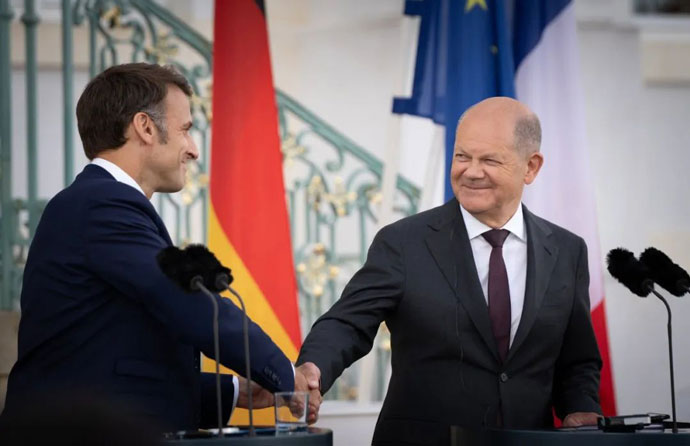
French President Emmanuel Macron made a state visit laden with political symbolism to Germany in May. A visit that was touted by the two countries — both major players in the European Union — as a signal of their enhanced cooperation and commitment to shaping European sovereignty. Macron and German Chancellor Olaf Scholz underscored this with a joint article in the Financial Times, outlining their vision.
An examination of previous attitudes toward European autonomy reveals that France has actively pursued such policies, while Germany has been more passive in its efforts. This is attributable to the long-standing French culture of independence and to President Macron’s unique outlook of the European Union and the role he sees his country playing in it. At the G7 Summit in May 2017, shocked by the disruptive impacts of U.S. President Donald Trump’s “America first” policy, which he announced, then-German Chancellor Angela Merkel stressed that “Europe must take its fate into its own hands.”
In September that year, Macron re-emphasized the “European idea” in a speech at Sorbonne University, calling for efforts to strengthen the European economy, security and technology, in order to achieve greater autonomy.
Later, in a speech delivered to the Bundestag, the German federal parliament, after the outbreak of the Russia-Ukraine conflict (in February 2022), Chancellor Scholz advanced the concept of Zeitenwende, an epochal tectonic shift.
Seven years after his initial speech, President Macron visited Sorbonne University again in April to elaborate on his vision for the future of the European Union, stating “without this action, without this progress toward European sovereignty and unity, we would undoubtedly have been left behind by history.”
Such statements illustrate the leaders’ consensus on the way forward — namely, adaptation and pursuit of greater independence and development. In particular, Brexit, the Trump presidency, the COVID-19 pandemic and the Russia-Ukraine conflict have all exacerbated Europe’s internal and external divisions. In this context, the joint article published by Macron and Scholz represents their strongest stance in recent years.
Their joint initiative, while not an official agreement, represents a significant contribution to the pursuit of European sovereignty. First, sovereignty is expected to be the largest uniting factor for the EU to establish greater autonomy. Since Macron raised the issue of “European sovereignty”, France has consistently pushed for strategic autonomy, but has received little support from other E.U. members, including Germany.
This is because gaining strategic autonomy would diminish the U.S.’ military role in Europe, something that many countries consider as going against political norms. On top of that, since the Russia-Ukraine conflict, increased U.S. presence on the continent has cast doubts over the E.U.’s ability to achieve strategic autonomy.
However, the Franco-German initiative indicates Berlin’s support and will prioritize self-sufficiency.
At the same time, Berlin, which in the past has been cautious of joint action by the EU, has realized the urgency and necessity of European sovereignty in addressing the economic, political, diplomatic, and security challenges faced by the EU.
Meanwhile, France and Germany agree that the pursuit of European sovereignty should start in the economic sector. The leaders’ article focuses on boosting the EU’s economic and industrial competitiveness through different means including rolling out ambitious industrial policies to support the green and digital sectors. An overhaul of the European financial sector will also be needed to increase its efficiency, while enhancing the resilience of key products and supply chains to counter the impact of geopolitical risks.
These measures demonstrate that the leaders recognize the urgent need to reverse Europe’s decline in international economic standing, that has resulted from previous global crises.
A stronger economic and industrial foundations will also provide essential material preconditions for other factors contributing to European sovereignty.
Although they advocate for European sovereignty, the article tries to avoid creating tensions with the United States. It is confined to the economic and industrial sectors and doesn’t include responses to industrial competition from the U.S. This contrasts sharply with the comprehensive framework outlined by Macron at Sorbonne University. As Professor Randy Boyagoda of the University of Toronto said, “The EU call to arms lacked a foreign policy perspective.”
The limited scope of European sovereignty endorsed by the two countries reflects not only the strong impact of Atlanticism on Germany, but the differing opinions amongst EU members on exactly what the cornerstone of European security should be. It also shows that diminishing NATO’s influence over European security is still considered a political taboo.
As Washington has shifted its strategic focus to its rivalry with China, there is a growing camp arguing for Europe to be responsible for its own security. Unfortunately, the United States will not allow significant strides in European sovereignty as it would diminish NATO’s influence across the continent, undermining the foundation of its global alliances. Even if Brussels aims for sovereignty in the trade and economic sectors alone, its competition with Washington for capital, human resources, and business is expected to intensify. Moreover, Washington’s “America first” approach to economic issues is likely to persist, regardless of who becomes the next president. This is one of the biggest challenges the European Union faces in its endeavor to achieve economic autonomy.
